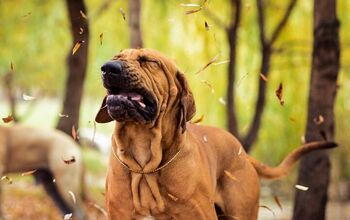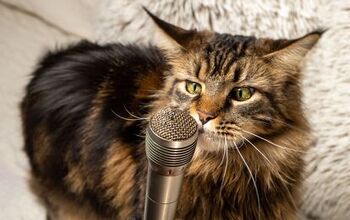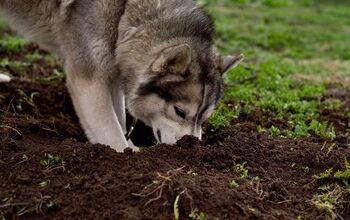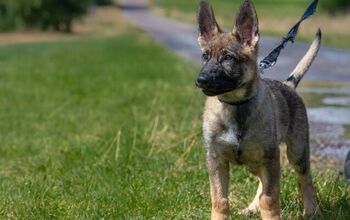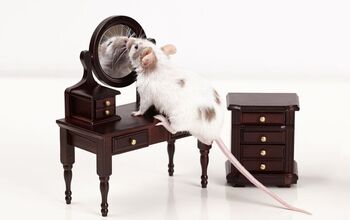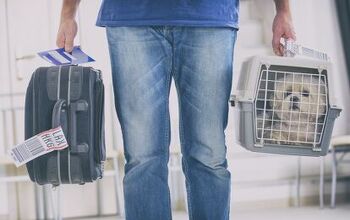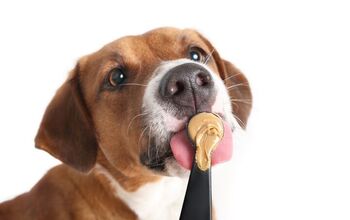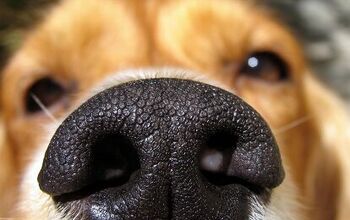Big Bang Theory: The Science Behind Dogs & Loud Noise

Whenever I decide to make dinner at my boyfriend’s house, his black lab Blue goes running down to the family room and hides between the sofa and coffee table. Trembling, he’ll stay there for however long it takes me to finish whatever I’m doing and coax him up with a treat. Why does Blue run? Perhaps it’s because from time to time, I’ve been known to set off the smoke detector. Blue anticipates this and heads for cover as soon as he sees me open the oven door while black lab mix Cody stays close at hand waiting for bits of carrot or celery to land his way.
Apparently this mixed reaction to sudden and loud noises is not that uncommon amongst our canine friends and it intrigued Oslo’s Faculty of Veterinary Medicine and Biosciences at Norwegian University of Life Sciences so much so, that they decided to research the phenomenon.
Related: Study Finds That Classical Music Calms Kennel Dogs
Their quest was to understand why some dogs react while others do not and their research included studying the behavior of 5,257 dogs from 17 different breed clubs. Owners completed an online survey that asked them to rate their pooch’s sensitivity to noise from four different scenarios: fireworks, loud noises (banging sounds/gunshots), thunderstorms and heavy traffic (Hmmm…. no smoke detectors).
For each of the four noises, owners rated the severity of their dog’s responses on a fear scale of one-to-five that included a low of “no signs” to a high of “very strong signs” of anxiety.
Of those surveyed, 23 percent scored a “very strong” for at least one of the four noise types and was thereby deemed a noise sensitive, fearful dog.
Related: Plug It In, Chill Out: Do Pet Pheromone Plugs-Ins Really Work?
What makes these 23 percent so anxious? Suggestions have been offered up and include everything from genetics to a traumatic experience to social transmission (learned response from other dogs), or even parental reaction that includes punishment for fear related behaviors or over-coddling. But it seems that physiological played a bigger factor over psychological. In addition to pinpointing fireworks and thunder as garnering the strongest reaction from fearful pooches, age played a factor with older dogs being more anxious, females being 30 percent more sensitive to noise than males and neutered animals versus un-neutered being 72 percent more likely to cower from sudden noises.
Additionally, certain breeds proved more fearful of sudden noises including the Norwegian Buhunds, Shiba Inus, Lagotto Romagnolo and Irish Soft Coated Wheaten Terriers. The least bothered by things that go bang in the night included Pointers, Great Danes, Boxers and Chinese Crested dogs.
In spite of the leaning towards nature versus nurture, the research data did not rule out the fact that each subject’s personal history might also have influenced his reaction to the noises. Stanley Coren, author of The Modern Dog, The Intelligence of Dogs and Why Does My Dog Act That Way? states “… if we are looking at a general physiological predisposition toward fearfulness, then noise sensitivity should predict the anxiety related behavior of a dog in other situations as well. The results of this investigation seem to confirm that. A dog which is fearful to loud noises turns out to be three times more likely to show separation anxiety.”
Apparently said dog also takes longer to calm after a frightening or stressful situation. So this means I’m really going to have to up my game when it comes to the type of treat used to woo Blue out of hiding.
[Source: Psychology Today]

Sharing space with three seriously judgy Schnoodles and a feline who prefers to be left alone. #LivingMyBestLife
More by Mary Simpson





